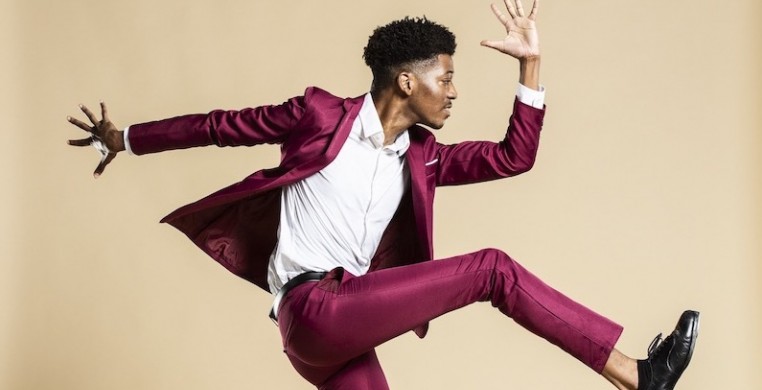Regardless of how we once defined a dance performance, current world circumstances are forcing artists to reevaluate the concept with social distancing guidelines in mind. In an effort to maintain creative momentum, Chicago Tap Theatre—founded in 2002 by Mark Yonally—is dedicating itself to the innovative and collaborative nature of a livestream tap performance.
Screened on Sunday, “30 Feet Together, 6 Feet Apart” was a 50-minute compilation of pieces presented virtually, one-time-only. The seven works on the program—by Kirsten Uttich, Sterling Harris and Case Prime, Rich Ashworth and Yonally— are an ode to the necessity of dance and music right now. So, it was from my laptop, sipping coffee on my deck, that I watched the group of 11 tappers and four musicians perform at Chicago’s historic Athenaeum Theatre in real time.
Before the dancing began, Chicago Tap Theatre opted to disclose their compliance with CDC social distancing guidelines in a much-appreciated pre-show slideshow. Infographics ensured nobody had touched one another throughout the rehearsal process. Dancers maintained a distance of six feet between them, and all people involved— minus emcee and vocalist JC Brooks—remained masked throughout the entire performance. In addition to their honest approach, the company highlighted the heart of tap dance via videos of younger students performing in their homes and stories from past and present company members detailing favorite instructors and personal tap icons.
Sure enough, as the opener, Yonally’s “Six Beats Apart,” started, a quintet of tappers entered the space donning face masks embellished with the Chicago flag, which gave me confidence as far as safety is concerned. The muted palette and pedestrian costuming felt familiar from my home setting; their jovial shuffles, in succinct unison, induced a smile even through my computer screen.
In keeping with Chicago Tap Theatre’s history of musical collaboration, a jazz trio—guitarist Evan Pinter, bassist Evan Levine and percussionist Jeremy Tromburg— lined the back of the stage wearing the same Chi-enthusiastic masks. Jazzy music amplified the crispness of taps hitting the stage in a deeply complimentary manner. One symphony of sounds would seem hollow without the other.
The cameras captured an up close and personal view throughout Harris and Prime’s co-choreographed Latin-inspired duet, “Upstage Rumba,” and during the company’s improvisation-turned-choreography, called “Birdland.” The first three pieces maintained an infectiously high-energy performance quality and showcased the company’s skill set. With a peak viewership of 302, “30 Feet Together, 6 Feet Apart” provided spectators with an intimate glimpse at the precision required of a tap dancer. In a way, the new vantage point effectively offered more information than is possible from a chair in a theater.
Uttich’s “Superstar,” sultry and Fosse-inspired, afforded JC Brooks the opportunity to sing his rendition of Lupe Fiasco’s song of the same name with gumption. The piece is also a farewell to Uttich as this performance was her last one as Chicago Tap Theatre’s rehearsal director. Her cliché costumes—black sequins and bowler hats— and over-the-top, snappy tap moves shifted the performance’s aesthetic away from its casual openers.
Coming next, “A Song of Great Social and Political Import” and “The Beat Goes On,” both by former rehearsal director Ashworth, had an undeniable air of authority effortlessly executed by the artists dancing his creations. “A Song of Great Social and Political Import” was easily the most captivating piece in the show. A trio of tappers created the rhythm and melody themselves as the sound of taps hit the stage in unison while they stuck quarters against glass bottles. The three tappers never left the evenly spaced, horizontal line they started in, yet the strength and vigor they performed with made it feel like the stage wasn’t nearly big enough.
In the final dance, “Somebody to Love,” Brooks sang the famed Queen song as the entire group of 11 dancers filled the stage with brightly colored costumes and smiling eyes behind their masks. Complex formation changes paired with a myriad of onstage/offstage transitions made this closer feel dynamic and larger than life. As the 22 shoes struck the microphoned stage it sounded as though an audience full of people were clapping along with dancers as the lights faded to black. It was a cheery note to end on, a welcomed emotion in the current climate.
Though the afternoon’s performance didn’t provide anything choreographically earthshattering, it did make space to marvel at and recognize the technical prowess required of these tap dancers. Chicago Tap Theatre deserves deep respect for their compliance with the social distance guidelines, and for their determination to push forward during this time. “We really wanted to prove there is a model for dance going forward during this time,” said Yonally during the Q&A post-performance. Based on their Sunday afternoon show, Chicago Tap Theatre achieved that goal.


